- Home
- Stanley G. Weinbaum
Dawn of Flame Page 2
Dawn of Flame Read online
Page 2
"I love fighting," said Hull.
"Yes, but would you love it if it meant simply the destroying of thousands of men beyond the horizon? Men you were never to see?"
"No. War should be man to man, or at least no farther than the carry of a rifle ball."
"True. Well, some time near the end of their twentieth century, the ancient world exploded into war like a powder horn in a fire. They say every nation fought, and battles surged back and forth across seas and continents. It was not only nation against nation, but race against race, black and white and yellow and red, all embroiled in a titanic struggle."
"Yellow and red?" echoed Hull. "There are a few black men called Nigs in Ozarky, but I never heard of yellow or red men."
"I have seen yellow men," said Old Einar. "There are some towns of yellow men on the edge of the western ocean, in the region called Friscia. The red race, they say, is gone, wiped out by the plague called the Grey Death, to which they yielded more readily than the other races."
"I have heard of the Grey Death," said Hull. "When I was very young, there was an old, old man who used to say that his grand-father had lived in the days of the Death."
Old Einar smiled. "I doubt it, Hull. It was something over two and a half centuries ago. However," he resumed, "the great ancient nations were at war, and as I say, they fought with diseases. Whether some nation learned the secret of the Grey Death, or whether it grew up as a sort of cross between two or more other diseases, I do not know. Martin Sair says that diseases are living things, so it may be so. At any rate, the Grey Death leaped suddenly across the world, striking alike at all people. Everywhere it blasted the armies, the cities, the countryside, and of those it struck, six out of every ten died. There must have been chaos in the world; we have not a single book printed during that time, and only legend tells the story.
"But the war collapsed. Armies suddenly found themselves unopposed, and then were blasted before they could move. Ships in mid-ocean were stricken, and drifted unmanned to pile in wreckage, or to destroy others. In the cities the dead were piled in the streets, and after a while, were simply left where they fell, while those who survived fled away into the country. What remained of the armies became little better than roving robber bands, and by the third year of the plague there were few if any stable governments in the world."
"What stopped it?" asked Hull.
"I do not know. They end, these pestilences. Those who take it and live cannot take it a second time, and those who are somehow immune do not take it at all, and the rest — die. The Grey Death swept the world for three years; when it ended, according to Martin Sair, one person in four had died. But the plague came back in lessening waves for many years; only a pestilence in the Ancient's fourteenth century, called the Black Death, seems ever to have equaled it.
"Yet its effects were only beginning. The ancient transport system had simply collapsed, and the cities were starving. Hungry gangs began raiding the countryside, and instead of one vast war there were now a million little battles. The weapons of the Ancients were everywhere, and these battles were fierce enough, in all truth, though nothing like the colossal encounters of the great war. Year by year the cities decayed until by the fiftieth year after the Grey Death, the world's population had fallen by three-fourths, and civilization was ended. It was barbarism now that ruled the world, but only barbarism, not savagery. People still remembered the mighty ancient civilization, and everywhere there were attempts to combine into the old nations, but these failed for lack of great leaders."
"As they should fail," said Hull. "We have freedom now."
"Perhaps. By the first century after the Plague, there was little left of the Ancients save their ruined cities where lurked robber bands that scoured the country by night. They had little interest in anything save food or the coined money of the old nations, and they did incalculable damage. Few could read, and on cold nights was usual to raid the ancient libraries for books to burn and to make things worse, fire gutted the ruins of all cities, and there was no organized resistance to it. The flames simply burned themselves out, and priceless books vanished."
"Yet in N'Orleans they study, don't they?" asked Hull.
"Yes, I'm coming to that. About two centuries after the Plague — a hundred years ago, that is — the world had stabilized itself. It was much as it is here today, with little farming towns and vast stretches of deserted country. Gunpowder had been rediscovered, rifles were used, and most of the robber bands had been destroyed. And then, into the town of N'Orleans, built beside the ancient city, came young John Holland.
"Holland was a rare specimen, anxious for learning. He found the remains of an ancient library and began slowly to decipher the archaic words in the few books that had survived. Little by little others joined him, and as the word spread slowly, men from other sections wandered in with books, and the Academy was born. No one taught, of course; it was just a group of studious men living a sort of communistic, monastic life. There was no attempt at practical use of the ancient knowledge until a youth named Teran had a dream — no less a dream than to recondition the centuries-old power machines of N'Orleans, to give the city the power that travels on wires!"
"What's that?" asked Hull. "What's that, Old Einar?"
"You wouldn't understand, Hull. Teran was an enthusiast; it didn't stop him to realize that there was no coal or oil to run his machines. He believed that when power was needed, it would be there, so he and his followers scrubbed and filed and welded away, and Teran was right. When he needed power, it was there.
"This was the gift of a man named Olin, who had unearthed the last, the crowning secret of the Ancients, the power called atomic energy. He gave it to Teran, and N'Orleans became a miracle city where lights glowed and wheels turned. Men came from every part of the continent to see, and among these were two called Martin Sair and Joaquin Smith, come out of Mexico with the half-sister of Joaquin, the Satanically beautiful being sometimes called Black Margot.
"Martin Sair was a genius. He found his field in the study of medicine, and it was less than ten years before he had uncovered the secret of the hard rays. He was studying sterility but he found — immortality!"
"Then the Immortals are immortal!" murmured Hull.
"It may be, Hull. At least they do not seem to age, but — Well, Joaquin Smith was also a genius, but of a different sort. He dreamed of the re-uniting of the peoples of the country. I think he dreams of even more, Hull; people say he will stop when he rules a hundred cities, but I think he dreams of an American Empire, or" — Old Einar's voice dropped — "a world Empire. At least, he took Martin Sair's immortality and traded it for power. The Second Enlightenment was dawning and there was genius in N'Orleans. He traded immortality to Kohlmar for a weapon, he offered it to Olin for atomic power, but Olin was already past youth, and refused, partly because he didn't want it, and partly because he was not entirely in sympathy with Joaquin Smith. So the Master seized the secret of the atom despite Olin, and the Conquest began.
"N'Orleans, directly under the influence of the Master's magnetic personality, was ready to yield, and yielded to him cheering. He raised his army and marched north, and everywhere cities fell or yielded willingly. Joaquin Smith is magnificent, and men flock to him, cities cheer him, even the wives and children of the slain swear allegiance when he forgives them in that noble manner of his. Only here and there men hate him bitterly, and speak such words as tyrant, and talk of freedom."
"Such are the mountainies," said Hull.
"Not even the mountainies can stand the ionic beams that Kohlmar dug out of ancient books, nor the Erden resonator that explodes gunpowder miles away. I think that Joaquin Smith will succeed, Hull. Moreover, I do not think it entirely bad that he should, for he is a great ruler, and a bringer of civilization."
"What are they like, the Immortals?"
"Well, Martin Sair is as cold as mountain rock, and the Princess Margaret is like black fire. Even my old bones feel younger only to look
at her, and it is wise for young men not to look at her at all, because she is quite heartless, ruthless, and pitiless. As for Joaquin Smith, the Master — I do not know the words to describe so complex a character, and I know him well. He is mild, perhaps, but enormously strong, kind or cruel as suits his purpose, glitteringly intelligent, and dangerously charming."
"You know him!" echoed Hull, and added curiously, "What is your other name, Old Einar, you who know the Immortals?"
The old man smiled. "When I was born," he said, "my parents called me Einar Olin."
Three. THE MASTER MARCHES
Joaquin Smith was marching.
Hull Tarvish leaned against the door of File Ormson's iron worker's shop in Ormiston, and stared across the fields and across the woodlands, and across to the blue mountains of Ozarky in the south. There is where he should have been, there with the mountainy men, but by the time the tired rider had brought the news to Selui, and by the time Hull had reached Ormiston, it was already too late, and Ozarky was but an outlying province of the expanding Empire, while the Master camped there above Norse, and sent representations to Selui.
Selui wasn't going to yield. Already the towns of the three months old Selui Confederation were sending in their men, from Bloom'ton, from Cairo, even from distant Ch'cago on the shores of the saltless sea Mitchin. The men of the Confederation hated the little, slender, dark Ch'cagoans, for they had not yet forgotten the disastrous battle at Starved Rock, but any allies were welcome against Joaquin Smith. The Ch'cagoans were good enough fighters, too, and heart and soul in the cause, for if the Master took Selui, his Empire would reach dangerously close to the saltless seas, spreading from the ocean on the east to the mountains on the west, and north as far as the great confluence of the M'sippi and M'souri.
Hull knew there was fighting ahead, and he relished it. It was too bad that he couldn't have fought in Ozarky for his own people, but Ormiston would do. That was his home for the present, since he'd found work here with File Ormson, the squat iron-worker, broad-shouldered as Hull himself and a head shorter. Pleasant work for his mighty muscles, though at the moment there was nothing to do.
He stared at the peaceful countryside. Joaquin Smith was marching, and beyond the village, the farmers were still working in their fields. Hull listened to the slow Sowing Song:
"This is what the ground needs: First the plow and then the seeds, Then the harrow and then the hoe, And rain to make the harvest grow.
"This is what the man needs: First the promises, then the deeds, Then the arrow and then the blade, And last the digger with his black spade.
"This is what his wife needs: First a garden free of weeds, Then the daughter, and their the son, And a fireplace warm when the work is done.
"This is what his son needs — "
Hull ceased to listen. They were singing, but Joaquin Smith was marching, marching with the men of a hundred cities, with his black banner and its golden serpent fluttering. That serpent, Old Einar had said, was the Midgard Serpent, which ancient legend related had encircled the earth. It was the symbol of the Master's dream, and for a moment Hull had a stirring of sympathy for that dream.
"No!" he growled to himself. "Freedom's better, and it's for us to blow the head from the Midgard Serpent."
A voice sounded at his side. "Hull! Big Hull Tarvish! Are you too proud to notice humble folk?"
It was Vail Ormiston, her violet eyes whimsical below her smooth copper hair. He flushed; he was not used to the ways of these valley girls, who flirted frankly and openly in a manner impossible to the shy girls of the mountains. Yet he — well, in a way, he liked it, and he liked Vail Ormiston, and he remembered pleasantly an evening two days ago when he had sat and talked a full three hours with her on the bench by the tree that shaded Ormiston well. And he remembered the walk through the fields when she had shown him the mouth of the great ancient storm sewer that had run under the dead city, and that still stretched crumbling for miles underground toward the hills, and he recalled her story of how, when a child, she had lost herself in it, so that her father had planted the tangle of blackberry bushes that still concealed the opening.
He grinned, "Is it the eldarch's daughter speaking of humble folk? Your father will be taxing me double if he hears of this."
She tossed her helmet of metallic hair. "He will if he sees you in that Selui finery of yours." Her eyes twinkled. "For whose eyes was it bought, Hull? For you'd be better saving your money."
"Save silver, lose luck," he retorted. After all, it wasn't so difficult a task to talk to her. "Anyway, better a smile from you than the glitter of money."
She laughed. "But how quickly you learn, mountainy! Still, what if I say I liked you better in tatters, with your powerful brown muscles quivering through the rips?"
"Do you say it, Vail?"
"Yes, then!"
He chuckled, raising his great hands to his shoulders. There was the rasp of tearing cloth, and a long rent gleamed in the back of his Selui shirt. "There, Vail!"
"Oh!" she gasped. "Hull, you wastrel! But it's only a seam." She fumbled in the bag at her belt. "Let me stitch it back for you."
She bent behind him, and he could feel her breath on his skin, warm as spring sunshine. He set his jaw, scowled, and then plunged determinedly into what he had to say. "I'd like to talk to you again this evening, Vail."
He sensed her smile at his back. "Would you?" she murmured demurely.
"Yes, if Enoch Ormiston hasn't spoken first for your time."
"But he has, Hull."
He knew she was teasing him deliberately. "I'm sorry," he said shortly.
"But — I told him I was busy," she finished.
"And are you?"
Her voice was a whisper behind him. "No. Not unless you tell me I am."
His great roar of a laugh sounded. "Then I tell you so, Vail."
He felt her tug at the seam, then she leaned very close to his neck, but it was only to bite the thread with her white teeth. "So!" she said gaily. "Once mended, twice new."
Before Hull could answer there came the clang of File Ormson's sledge, and the measured bellow of his Forge Song. They listened as his resounding strokes beat time to the song.
"Then it's ho — oh — ho — oh — ho! While I'm singing to the ringing Of each blow — blow — blow! Till the metal's soft as butter Let my forge and bellows sputter Like the revels of the devils down below — low — LOW! Like the revels of the devils down below!"
"I must go," said Hull, smiling reluctantly. "There's work for me now."
"What does File make?" asked Vail.
Instantly Hull's smile faded. "He forges — a sword!"
Vail too was no longer the joyous one of a moment ago. Over both of them had come a shadow, the shadow of the Empire. Out in the blue hills of Ozarky Joaquin Smith was marching.
* * *
Evening. Hull watched the glint of a copper moon on Vail's copper hair, and leaned back on the bench. Not the one near the pump this time; that had been already occupied by two laughing couples, and though they had been welcomed eagerly enough, Hull had preferred to be alone. It wasn't mountain shyness any more, for his great, good-natured presence had found ready friendship in Ormiston village; it was merely the projection of that moodiness that had settled over both of them at parting, and so they sat now on the bench near Vail Ormiston's gate at the edge of town. Behind them the stone house loomed dark, for her father was scurrying about in town on Confederation business, and the help had availed themselves of the evening of freedom to join the crowd in the village square. But the yellow daylight of the oil lamp showed across the road in the house of Hue Helm, the farmer who had brought Hull from Norse to Ormiston.
It was at this light that Hull stared thoughtfully. "I like fighting," he repeated, "but somehow the joy has gone out of this. It's as if one waited an approaching thunder cloud."
"How," asked Vail in a timid, small voice, "can one fight magic?"
"There is no magic," said the yout
h, echoing Old Einar's words. "There is no such thing — "
"Hull! How can you say such stupid words?"
"I say what was told me by one who knows."
"No magic!" echoed Vail. "Then tell me what gives the wizards of the south their power. Why is it that Joaquin Smith has never lost a battle? What stole away the courage of the men of the Memphis League, who are good fighting men? And what — for this I have seen with my own eyes — pushes the horseless wagons of N'Orleans through the streets, and what lights that city by night? If not magic, then what?"
"Knowledge," said Hull. "The knowledge of the Ancients."
"The knowledge of the Ancients was magic," said the girl. "Everyone knows that the Ancients were wizards, warlocks, and sorcerers. If Holland, Olin, and Martin Sair are not sorcerers, then what are they? If Black Margot is no witch, then my eyes never looked on one."
"Have you seen them?" queried Hull.
"Of course, all but Holland, who is dead. Three years ago during the Peace of Memphis my father and I traveled into the Empire. I saw all of them about the city of N'Orleans."
"And is she — what they say she is?"
"The Princess?" Vail's eyes dropped. "Men say she is beautiful."
"But you think not?"
"What if she is?" snapped the girl almost defiantly. "Her beauty is like her youth, like her very life — artificial, preserved after its allotted time, frozen. That's it — frozen by sorcery. And as for the rest of her — " Vail's voice lowered, hesitated, for not even the plain-spoken valley girls discussed such things with men. "They say she has outworn a dozen lovers," she whispered.

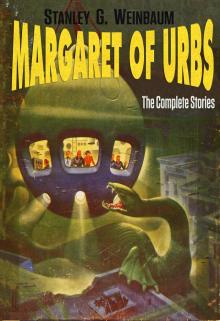 The Complete Margaret of Urbs
The Complete Margaret of Urbs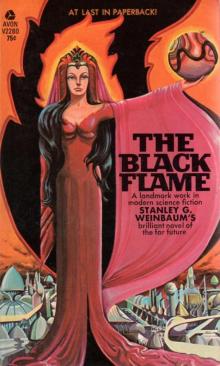 The Black Flame
The Black Flame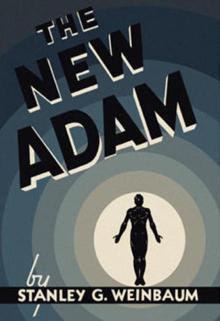 The New Adam
The New Adam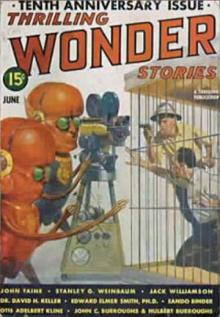 Dawn of Flame
Dawn of Flame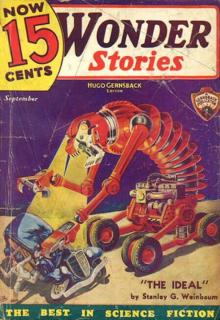 The Ideal
The Ideal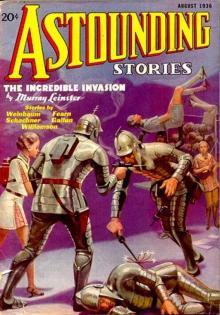 Proteus Island
Proteus Island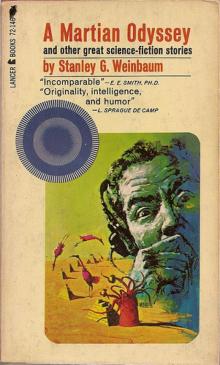 The Worlds of If
The Worlds of If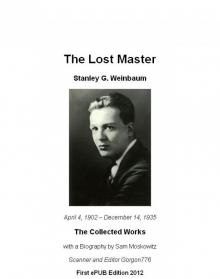 The Lost Master - The Collected Works
The Lost Master - The Collected Works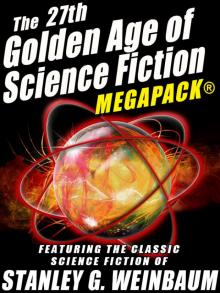 The 27th Golden Age of Science Fiction
The 27th Golden Age of Science Fiction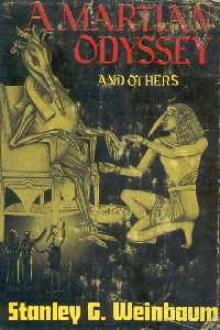 A Martian Odyssey
A Martian Odyssey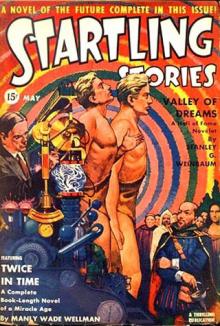 Valley of Dreams
Valley of Dreams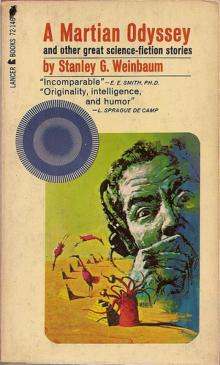 The Point of View
The Point of View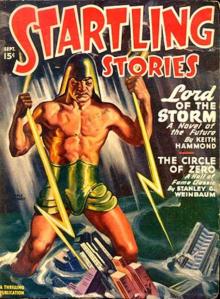 The Circle of Zero
The Circle of Zero